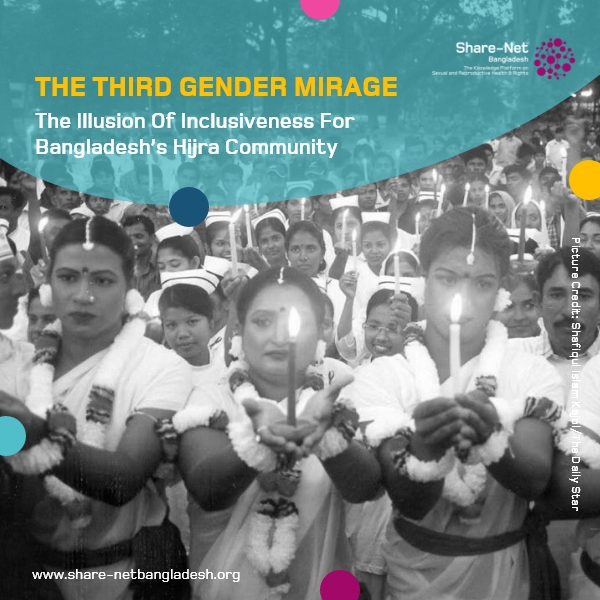The Third Gender Mirage: The Illusion of Inclusiveness for Bangladesh’s Hijra Community
In 2013, Bangladesh granted the hijra community official “third gender” status, a move heralded as progressive in the fight for gender equality. However, this legal recognition has done little to change the hijra community’s historically marginalised status, and the grim realities they face remain largely unaddressed.
Despite the constitutional acknowledgment, the hijra community in Bangladesh continues to struggle for basic human rights and social acceptance. They are often coerced into identifying as third gender in official documents, a forced categorisation that strips them of their right to self-identify. The government’s push for self-identification was seen as a pathway to access benefits, but the policy’s shortcomings have only worsened their situation. The term “hijra,” which is used disparagingly in Bangla society, adds to their ostracism, reinforcing negative stereotypes about their gender and sexuality.
Bangladesh’s hijra community, comprising intersex individuals, transgender women, and others, is complex and deeply rooted in cultural and historical contexts. Historically revered during the Mughal Empire, their status deteriorated drastically under British colonial rule, which criminalised and stigmatised them. This legacy of marginalisation persists today, with the hijra community facing widespread discrimination in education, healthcare, and employment.
The 2013 policy, designed to align with Western notions of gender progress, lacks the necessary support for real change. Many hijras who identified as third gender in hopes of improved conditions found government forms without options for their gender, excluding them from essential services and opportunities, including voter registration. This exclusion from the electoral process underlines the performative nature of the policy, which fails to address the community’s actual needs.
Education for hijra individuals remains inadequate. In 2020, the government opened the first school for the hijra community, but the curriculum is limited to religious teachings and vocational subjects, excluding essential subjects like Bangla, Mathematics, English, and Science. This approach perpetuates their exclusion from mainstream society, reinforcing societal biases and limiting their opportunities for upward mobility.
In the healthcare sector, hijras face severe discrimination and harassment. Many avoid seeking medical help due to fear of abuse and public humiliation. Despite seeking assistance from government facilities, their success rate in receiving healthcare services is below 50 percent. The lack of proper medical infrastructure and understanding for the third gender exacerbates their vulnerability, particularly concerning sexual and reproductive health rights (SRHR).
Economic marginalisation forces many hijras into sex work, dancing, and begging. Although prostitution is legal in Bangladesh, the criminalisation of homosexuality under Section 377 of the Penal Code puts them at constant risk of police harassment and extortion. This law, a remnant of British colonial rule, continues to hinder the community’s ability to live with dignity and safety.
The government’s superficial policies, such as labeling hijras as “third gender” or “disabled,” do little to address the deep-seated prejudices and systemic barriers they face. Legal recognition without accompanying social inclusion measures fails to bring about meaningful change. The hijra community’s plight highlights the urgent need for comprehensive anti-discrimination laws, inclusive education policies, and accessible healthcare services.
Bangladesh’s attempt to project a modern and progressive image to the world through such tokenistic policies has not translated into real improvements for the hijra community. For genuine progress, the government must move beyond symbolic gestures and implement substantive changes that uphold the sexual and reproductive health and rights of all its citisens, ensuring that no one is left behind.
The struggle of the hijra community in Bangladesh is a stark reminder of the gap between policy and practice. As the world watches Bangladesh’s economic rise, it is crucial to ensure that this growth is inclusive, embracing all gender identities and fostering a society where every individual can thrive.
Source: The Daily Star
Source Contributor: Sara Rashid
Picture Credit: Shafiqul Islam Kajol/The Daily Star


